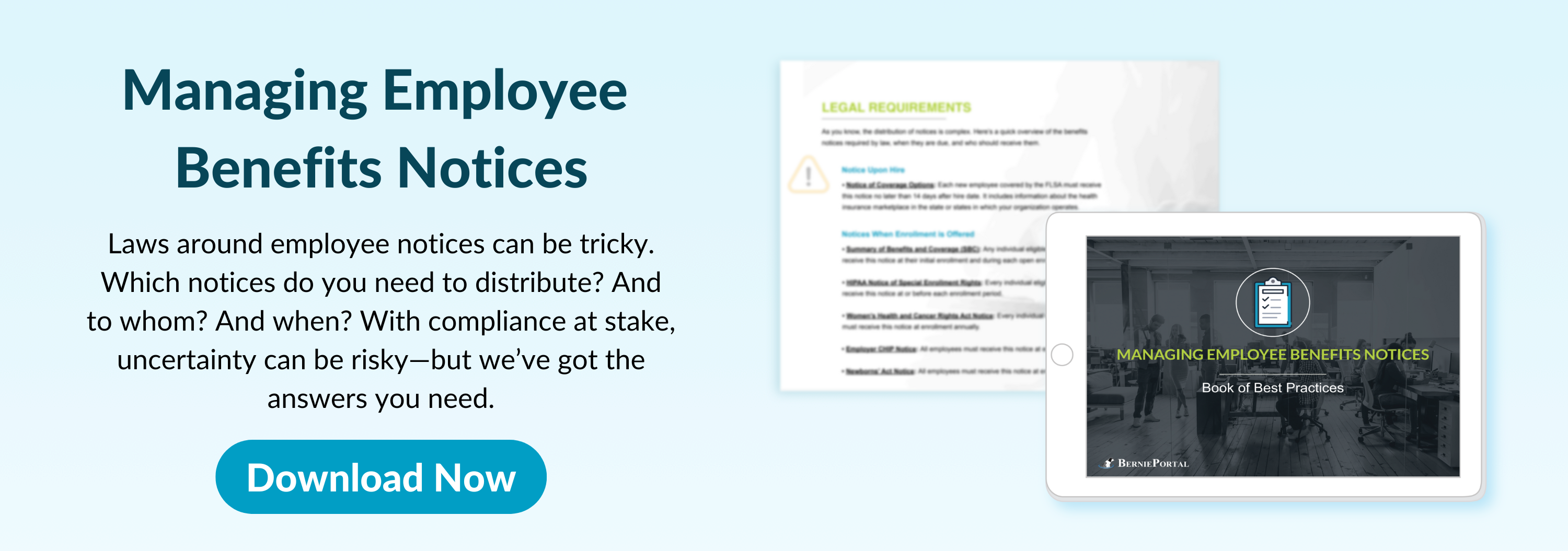Written by
Will Miranne
Will is an aPHR-certified writer on the marketing team at BerniePortal. He writes about healthcare, human resources, and benefits.
What Are the Different Healthcare Options for SMBs?

Healthcare in the United States can feel overwhelming and complex. Between deductibles, copays, and in-network providers, it can be difficult for employers and employees alike to make sense of how exactly their healthcare works.
Read on to learn about the various healthcare options available to organizations and their team members, and determine what plan is best for you.
Are SMBs Required to Offer Health Insurance to All Employees?
The Affordable Care Act (ACA) requires applicable large employers (ALEs)---any employer with 50 or more full-time employees working at least 30 hours per week—to offer its employees health insurance.
ALEs can determine their status by calculating their number of full-time equivalent (FTE) employees per month, calculating the number of hours worked by non-FTEs per month, adding the subtotals, and dividing that by 12.
-
If the total is less than 50, the employer is NOT an ALE.
-
If the total is at least 50, the employer IS an FTE and must offer health insurance to all qualifying employees.
A key provision in the ACA, known as the employer mandate, requires all ALEs to offer health insurance plans that qualify as minimum essential coverage (MEC). The penalties for organizations that fail to comply with MEC regulations are as follows:
-
$2,880 per employee if no coverage was offered, minus the first 30 full-time employees; or
-
$4,320 per employee if coverage was offered to at least 95% of employees, but the option didn’t meet MEC requirements under § 4980H(c)(1) and (b)(1) of the ACA.
These amounts have steadily increased each year since 2014 and are outlined in question 55 of the IRS Q&A on the ESRP.
Employers can work with benefits brokers to choose the right health insurance policy for their team.
What Is a PPO?
A preferred provider organization (PPO) is a health plan that offers participants an extensive network of healthcare providers.
If PPO members use in-network providers—including hospitals and doctors—the medical services are discounted to a pre-negotiated rate or covered entirely by the plan.
What Is an HSA?
A health savings account (HSA) is a personal bank account with significant tax advantages that an individual can use to pay for medical expenses that aren’t covered by their medical insurance—typically a high-deductible health insurance plan (HDHP).
The IRS issues contribution limits for HSAs each year, representing the total tax-advantaged dollars participants can deposit into their health savings accounts. Often these limits increase to account for cost-of-living adjustments.
Employers should note that there are some critical differences between HSAs and PPOs. While not every PPO plan offers eligibility for HSAs, many PPO networks provide comprehensive coverage and are compatible with HSAs, as long as the member uses in-network providers.
HSA’s actually allow for a triple tax advantage. Carrie Schwab-Pomerantz, President & Board Chair at Charles Schwab Foundation, does a great job of explaining this in her newsletter Ask Carrie. She says:
“One tax advantage is good. Three are better.
- First, contributions to an HSA are federally tax-deductible, reducing your taxable income. Depending on where you live, you may also get a break on state income taxes.
- Second, both contributions and earnings grow federal tax-free.
- Third, withdrawals for qualified out-of-pocket medical expenses are also tax free—whenever you take them, no matter your age. Those expenses can include deductibles, copayments, prescriptions, and necessary medical equipment as well as medical care not covered by insurance such as dental, vision, hearing, and long-term care. You can also use it to pay for medical expenses for a spouse or other dependent.”
What Is an HMO Plan?
A health maintenance organization (HMO) is a type of health insurance plan that provides people with all in-network care.
This means that employees or individuals covered by an HMO have one primary care physician (PCP) for appointments and are not permitted to receive covered care out-of-network. As a result, Investopedia points out that premiums are typically lower under HMO plans, deductibles are generally lower or nonexistent, and copays are often affordable.
What Is a High-Deductible Health Insurance Plan (HDHP)?
A high-deductible health insurance plan (HDHP) is a type of healthcare coverage requiring participants to spend more on up-front costs before the insurance company contributes to covering expenses. In many cases, people with HDHPs pay less per month on premiums.
Different types of healthcare coverages can be considered HDHPs. Additionally, HDHPs can be paired with HSAs to help users pay for qualified medical expenses using tax-advantaged dollars.
What Is a POS Plan?
A point of service (POS) plan is a type of health insurance coverage where participants typically pay less in fees, copays, and other related expenses.
While costs may be lower than other types of plans, there are some limitations to POS plans, including that users must receive a referral from a PCP before they can see a medical specialist.
What Is an EPO Plan?
An exclusive provider organization (EPO) plan is a type of health insurance coverage where a participant’s expenses are only covered if they visit doctors, hospitals, or specialists that are in the plan’s network. There are some exceptions in the case of emergencies.
What Is Short-Term Health Insurance?
Short-term health insurance is excellent for individuals who need coverage for several months to a year. If those who are insured need to renew the coverage, they can do so up to three times. Essentially, people can maintain short-term coverage for three years.
The premise of these plans is to provide people with immediate access to coverage that is affordable and accessible.
What Is Obamacare?
The ACA—sometimes called “Obamacare”—was signed into law by President Obama in 2010. The law ushered in a significant overhaul of the U.S. healthcare system with three primary goals:
-
Make affordable health insurance available to more people. The law provides consumers with subsidies that lower costs for households with incomes between 100% and 400% of the federal poverty level.
-
Expand the Medicaid program to cover all adults with income below 138% of the federal poverty level.
-
Support innovative medical care delivery methods designed to lower health care costs.
Individuals and families can use the Obamacare system to enroll in federal healthcare marketplace plans as an alternative to purchasing coverage through their employer-sponsored plan—or if they don’t have access to insurance through their employer.
The costs and coverages of these ACA plans vary widely depending on the purchaser’s location, income, and family size. Depending on a policyholder’s annual household income, some individuals and families may qualify for a premium tax credit (PTC) to help them cover monthly medical expenses.
What Is COBRA?
The Consolidated Omnibus Budget Reconciliation Act (COBRA) is a set of laws by the Department of Labor (DOL) to protect covered employees from the possibility of losing health insurance coverage. It requires employers to provide employees, previous employees, spouses, former spouses, and dependent children with continuing coverage should their previous coverage end due to a qualifying event.
These events can include:
-
The death of a covered employee
-
The termination of employment
-
A reduction of work hours for reasons outside of misconduct
-
A covered employee becoming eligible for Medicare
-
The divorce of a covered employee
-
A child’s loss of dependent status
What Is a Self-Insured Plan?
Self-insurance is an alternative financing option for group health plans.
The major difference between self-insured and fully-insured plans is in regard to who operates the plan and who pays the claims. With self-funded insurance, the employer operates the plan and pays the claims, hiring a third-party administrator (TPA) to review those claims for accuracy and payment. With fully-funded insurance, the insurance company operates the plan and pays the claims.
Self-funded plans have fixed costs and variable costs. Variable costs refer to medical claims incurred by employees or their dependents, while fixed costs cover administering the plan. These fixed costs include stop-loss, also known as reinsurance coverage, which protects the employer from very high claims and can also include auditing services, claims support, medical management, and more.
Which Type of Health Insurance is Best?
There isn’t any single “best” employer-sponsored health insurance because the effectiveness of a plan is measured by how well it matches with the employer’s workforce.
For example, a company with employees fresh out of college may choose to offer an HDHP with an HSA because, generally speaking, younger people use their healthcare benefits less than their older counterparts. On the other hand, a workforce with more Baby Boomer employees may select a more traditional plan, such as a PPO.
According to Northwestern Mutual, the most common types of health insurance plans include HMOs, preferred provider organizations (PPO), and high-deductible health plans (HDHP) with health savings accounts (HSA).
Additional Resources
You can stay informed, educated, and up-to-date with important HR topics using BerniePortal’s comprehensive resources:
-
BernieU—free online HR courses, approved for SHRM and HRCI recertification credits
-
BerniePortal Blog—a one-stop shop for HR industry news
-
HR Glossary—featuring the most common HR terms, acronyms, and compliance
-
HR Guides—essential pillars, covering an extensive list of comprehensive HR topics
-
HR Party of One—our popular YouTube series and podcast, covering emerging HR trends and enduring HR topics
Written by
Will Miranne
Will is an aPHR-certified writer on the marketing team at BerniePortal. He writes about healthcare, human resources, and benefits.
Related Posts
Part-time work is becoming increasingly common in today’s workforce—especially for...
As an HR professional, you’re responsible for helping employees navigate their health...
Healthcare access has become a major priority for employers—and employees—over the past...
Summer is synonymous with vacations, PTO, and out-of-office messages—but it’s also the...








Submit a Comment